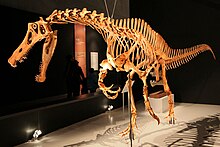Irritator
| Irritator Temporal range: Lower Cretaceous
110 mya | |
|---|---|

| |
| Reconstructed skeleton at the National Museum of Nature and Science, Tokyo. The postcranium is based on remains that cannot be confidently attributed to the animal. | |
| Scientific classification | |
| Domain: | Eukaryota |
| Kingdom: | Animalia |
| Phylum: | Chordata |
| Clade: | Dinosauria |
| Clade: | Saurischia |
| Clade: | Theropoda |
| Family: | †Spinosauridae |
| Subfamily: | †Spinosaurinae |
| Genus: | †Irritator Martill et al. 1996 |
| Species | |
| |
| Synonyms | |
| |
Irritator (say: irr-irr-it-at-or) is a genus of spinosaurid theropod dinosaur that lived in what is now Brazil, in the Lower Cretaceous. Its fossils are known from the Romualdo Formation.[1]
Irritator had straight and cone-shaped teeth. Its jaws were low, long and slender, with the nostrils placed well back from the front of the snout (all consistent with fish-eating). Irritator also had a narrow crest made of nasal bones on top of the skull.[2] Irritator's name comes from the English word "Irritation". It was given its name due to the feelings of the scientists who described it when they found that fossil dealers had added plaster to the front of the snout.[3]
References
- ↑ Aureliano, Tito; Ghilardi, Aline M.; Buck, Pedro V.; Fabbri, Matteo; Samathi, Adun; Delcourt, Rafael; Fernandes, Marcelo A.; Sander, Martin (2018-05-03). "Semi-aquatic adaptations in a spinosaur from the Lower Cretaceous of Brazil". Cretaceous Research. 90: 283–295. doi:10.1016/j.cretres.2018.04.024. ISSN 0195-6671. S2CID 134353898.
- ↑ Sues, H. D.; Frey, E.; Martill, D. M.; Scott, D. M. (2002). "Irritator challengeri, a spinosaurid (Dinosauria: Theropoda) from the Lower Cretaceous of Brazil". Journal of Vertebrate Paleontology. 22 (3): 535–547. doi:10.1671/0272-4634(2002)022[0535:ICASDT]2.0.CO;2. S2CID 131050889.
- ↑ Martill, D. M.; Cruickshank, A. R. I.; Frey, E.; Small, P. G.; Clarke, M. (1996). "A new crested maniraptoran dinosaur from the Santana Formation (Lower Cretaceous) of Brazil" (PDF). Journal of the Geological Society. 153 (1): 5–8. Bibcode:1996JGSoc.153....5M. doi:10.1144/gsjgs.153.1.0005. S2CID 131339386.